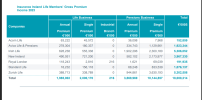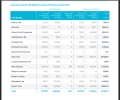Might be interesting to some to see how the main providers of products has changed over the ten years.
Plenty consolidation and no real activity on new entrants.
No growth at all on Single Premium Life Business in that period but interesting to note that the biggest writers of such business have ties with banks.


Plenty consolidation and no real activity on new entrants.
No growth at all on Single Premium Life Business in that period but interesting to note that the biggest writers of such business have ties with banks.

